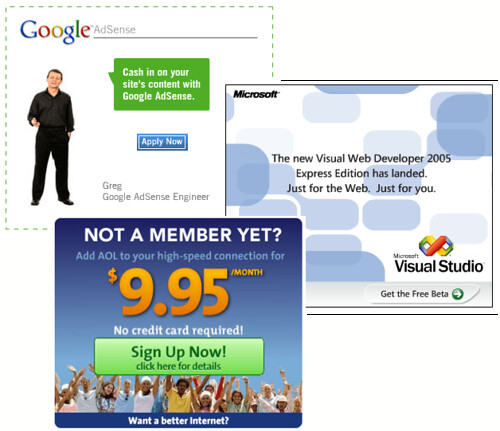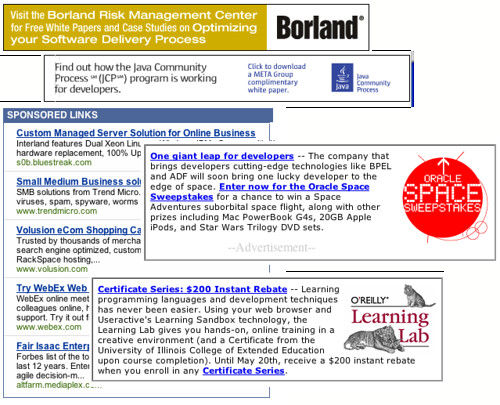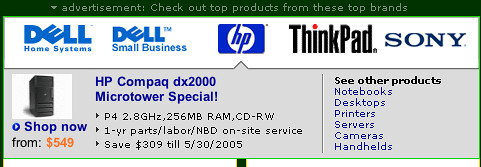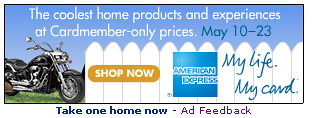Remaking Advertising As Conversation
Doc Searls famously remarked that "markets are conversations." It seems to me that advertising ought to be a conversation as well. Only it's normally a conversation with a bore (or a drunk) at a cocktail party, someone who backs you into a corner, talks incessantly about himself, and laughs too loud at his own jokes.
When I first imagined web advertising back in 1993, I had this idea that advertising content could be made much more useful online. Absent the limits of the 60-second spot or the high-cost magazine page, companies could provide rich, useful information about their products. And despite the intrusion of the annoying appurtenances of traditional advertising (banners, pop-ups, skyscrapers -- in short, the drunk referred to above), much of the vision has come true. Case in point: oreilly.com, O'Reilly's site devoted to advertising our company and our products, gets almost as much traffic as oreillynet.com, our collection of online content sites. According to our HitBox stats, the top catalog page last month, for the book Firefox Hacks, had an average of 6303 daily visitors, who spent an average of 2 minutes and 48 seconds on the page. That's advertising as content.
Given that advertisers now have the ability to give customers all the information they need to make informed purchase decisions, why did the internet end up recreating the annoyances of traditional advertising? Two words: surface area. Like the alveoli in our lungs, banner ads, popups and the like exist to create more surface area where customers and products can interact -- in short, have a conversation. Given that premise, though, you'd think that these ads would do a better job of starting the conversation when they first appear, rather than just trying to get you to click through by means of some bright color, a few words, or a picture.
I've been giving this subject a lot more thought lately because Dale Dougherty, who's run the O'Reilly Network from its inception, has moved over full time to Make, the new magazine he launched for us. I'm taking a more active hand in managing the network while we look for a new general manager.
One of the first questions I asked the team was "how can we make our advertising more useful?" I always put myself in the user's shoes, and I know that I rarely, if ever, click through any of the traditional types of web advertising. If ads aren't useful to users, they will get low response rates, so they aren't useful to advertisers either.
Thinking back, I've probably clicked through only one or two banner ads in the nearly twelve years I've been on the web, other than to check out some of the advertising on our own sites. However, I've clicked uncounted times on the contextual advertising that comes up in the course of a Google search, even though that form of advertising has been around for a much shorter time. So learning from search engine advertising seemed to me to be a good place to start thinking about ad usability.
Some of what makes search engine advertising work so well is the relevancy that is intrinsic to search. But another part, I believe, is the transparency of the ads. We're given a preview of what's on the other side of the link, much as we are for the search results themselves. What's more, there's almost always an offer. This style of advertising draws far more from the tradition of direct-response advertising than it does from traditional display or image advertising.
As it turns out, I was a bit behind the curve. While the intrusive, low-content popup, banner, or skyscraper is still a favorite of many ad agencies, we're seeing a lot of more interesting formats. Since I last stopped paying attention to web advertising, there's been a trend in display ads (often using Flash, but sometimes DHTML) to operate more as a conversation starter as well. Let's start by looking at the following old-style image ad (which appeared in a story on Forbes.com):
Now look at these transitional ads (taken from the O'Reilly Network and from AOL.com), which use much the same format, but include an actual direct-response offer:
Now contrast with this collection of new-style ads from the O'Reilly Network site ONjava.com, from the oreillynet hub, and from Forbes:
These ads draw heavily from the direct-response tradition (though you can see that Oracle had to work in a bit of image advertising as well.) Like search engine ads, they give you some context that lets you decide whether you want to click through or not.
Flash, DHTML and Ajax add more options. I was intrigued by this ad on CNet, which looks like a traditional ad.
When you mouse over it, though, the interactive offer panel drops down.
I think a lot more interesting things could be done with this kind of ad behavior. One of the ideas I kicked around with the oreillynet team was the idea of providing editorial and user feedback on ads as a way of making them more effective. The general feeling was that this wouldn't go over too well with the ad agencies. So I suggested a model in which we use Ajax, or maybe even Greasemonkey-style rewriting to add tooltips containing color commentary, user reviews, and so forth, on our ads. We'd probably piss off the ad agencies and some of the clients, but if we could make the ads more useful, that would be a big win, and in the end, one might hope that everyone would get over any bruised egos from the process. What do you think?
Speaking of reader feedback, I was intrigued to see a feedback link below an ad on Yahoo:
But I was disappointed by the fairly traditional survey I found on the other side of the feedback link. I'd love to explore ways to get more feedback on oreillynet ads, but would love to do it in a way that got a real conversation started. Ideas welcome.
Overall, I'd say that the web advertising world is moving in an interesting direction. I'm betting that as the effectiveness of this newer style of direct-response advertising works its way into the brains of ad agencies, we'll see less and less focus on the large, colorful popup, and more of the conversational "sponsored links" variety intermixed with editorial. The story's far from over. I believe that there's a real opportunity to remix advertising with user contributed content and conversation in order to make it more effective.
tags:
| comments: 22
| Sphere It
submit: ![]()
![]()
![]()
![]()
0 TrackBacks
TrackBack URL for this entry: http://blogs.oreilly.com/cgi-bin/mt/mt-t.cgi/4037
Comments: 22
Community site kuro5hin.org has had commentable ads for years now. Few ads actually have comments, but I don't know how many views these already got, that is want the "comment-through rate" is. Maybe the operator of kuro5hin can share some statistics? That would be quite interesting.
Here's an idea: make every advertisement a blog and every word in the advertisement a blog post. Words that have more (good) feedback are color highlighted in a del.icio.us way, and mousing over the word gives cnet-style additional information. Dividing up the ad in this way will lessen the impact of trolls and bad reviews, give first-glance information about what aspects of the ad have good reviews, and allow customers to focus on what part of the ad interests them. Obviously, the blog should be hosted by O'Reilly, not the advertiser, so that the customer has no qualms about clicking through after the mouseover.
Despite previewing, I don't think my above comment was very clear. To clarify: Google-style ads with words highlighed del.icio.us-style. Words that are moused-over show cnet-style additional information from the blog post for that word. Clicking on the word goes to the advertiser blog post with user comments. To add a comment a user must select a rating. A click on a blog post link to go to the advertiser's site is considered good feedback along with comment ratings. Good feedback for a word's blog post highlights the word in the original ad and unhighlights other words in the original ad. Advertisers can hijack the process and highlight certain words in the original ad, but it may work against them if the words they highlight are not the ones that interest their potential customers. Trolls don't get the individual attention they crave by messing up the ad highlighting.
The only problem with providing any kind of 'open-ended' feedback would be flamers and trollers who wouldn't comment on the ad itself (which seems to be the aim of the ad-feedback) but to the product advertised itself. I assume this is why survey-style feedback forms are used. Unfortunately, you'll always get someone flaming the product itself on any kind of open-feedback, but the aim of the style of feedback should be to minimize this.
One option is moderated feedback - but if the aim of the ad is to hit as many people as possible, this could be unmanageable.
There are many ways to provide open-ended feedback - I think the blog idea is fantastic as a start. This could be extended to grouping similar 'blog entries' (advertisments) for similar products or services, which could be browsable. (This kind of ad-blogging could be a separate company itself. Any entrepreneurs out there?)
The hard bit is the moderation of comments. Once you solve that, the rest should easily fall into place.
Very interesting and timely line of thought. And, while I understand that the frontiers of the idea would be the extent of the Web and Web advertising here, why not extend the idea out into the "traditional" space? I've spent the past year doing just that (and although I'd be pleased to, will not shill for the service that's come through market testing just recently). The upshot, however, is that advertising not only can be but should be and will be a "discussion." The market is itself demanding it by shutting off traditional advertising communication. It is quite a shift that's happening, the subtlety of which can't be underestimated. This conversation you've provoked will undoubtedly be a long one because advertisers are still grappling with the contextual change to their environment let alone with how to deal with the requirements of their new situation. Rather than continue, I'd point interested people to some essays I've written about this change (from my perspective) here: http://timothygrayson.com/recursive_content_bus.html The top four printable essays in the list are the ones that speak to this issue.
Maybe if "business blogging" takes off, there won't be much distinction between an advertisement and a blog post to begin with.
There is becoming an increasingly thin line between blogging and other kinds of communication - due to RSS feeds etc. - which work both ways. People get news to their blogs, and blogs themselves are becoming news sources. All of which I find completely fascinating, and something I think is very underestimated. If it could be used for something as diverse as advertising, there's no real limit to what information can be present in an open and discussion-like format.
I very much agree that blogging is driving the change. Not only is it making the web itself more of a conversation than ever before, it's also getting the attention of advertisers and their agencies. And that's really important. The agencies are the gatekeepers for a huge percentage of ad spending, and the more they are tuned in to new forms of engagement with "the former audience", the faster the change will happen. And believe me, PR agencies and ad agencies are really waking up to the power of blogging and other forms of online conversation. After all, as I read in one business book or another (really need to track down this quote, since I use it all the time!): "A market is a group of people who reference each other when making buying decisions."
if this is the same "O'Reilly on Advertising" that runs on CBC radio. I'd really appreciate a podcast of your show. I saw some references to one here on the site, but it wasn't super clear.
Thanks!
by the way, BBC did a great documentry (tv) called "The Century of the Self" that goes into these issues deeply. The influence of Freud on advertising theory etc. Highly recommended.
Also, Wally Olins book, On Brand.
and Scott Bedbury's "A new Brand world"
Sorry, Ben, no connection to a radio show called "O'Reilly on Advertising." Never heard of it. Sounds interesting. So I'll look for it.
O'Reilly on Advertising on CBC Radio One rocks! This is simply the best radio segment of its kind on advertising, anywhere. Look forward to the next installment. Airs Saturdays from 11:30 to 12 noon EST.
Ian -- just to be clear, that's a different O'Reilly --Terry, who does a radio show:
I too am looking for a podcast of O'Reilly on Advertising (yep that CBC guy again not Tim). Great stuff and would love to be able to archive all his shows so I can listen when I want.
Caught the Nov 26 show. This is good stuff. The sounds like material was fascinating More on Stan Freberg is appreciated especially as our green Christmas approaches.
For what it is worth I think I noticed that you pronounced what I think from context should be "mnenmonic" came out "newmonic" (sounds like).
Anyway your show is a ray of sunshine in an otherwise bleak commercial landscape. SO keep hacking
I would love to get copies of "O'Reilly on Advertising" as aired on CBC Radio One for my students at Oakland University in Michigan to hear. How csan I?
ooops sorry this is the wrong guy..
this is the cbc guy we're talking about.
http://www.cbc.ca/programguide/program/index.jsp?program=O%27Reilly+on+Advertising
Hi
there is a thin line between the person online feeling used or even abused for information mining and genuine converstion
Where do I find the PodCast! I've looked high and low on CBC.ca and the net!
It would be great to see!
Post A Comment:
STAY CONNECTED
RECENT COMMENTS
- S. Holtby on Remaking Advertising As Conversation: Where do I find the Pod...
- Peter on Remaking Advertising As Conversation: Hi there is a thin line...
- jon on Remaking Advertising As Conversation: ooops sorry this is the...
- jon on Remaking Advertising As Conversation: plz plz podcast!...
- Paul Ingraham on Remaking Advertising As Conversation: Another request for a p...
- Nkenge Zola on Remaking Advertising As Conversation: I would love to get cop...
- Ian Dew on Remaking Advertising As Conversation: Caught the Nov 26 show....
- bob on Remaking Advertising As Conversation: I too am looking for a ...
- Tim O'Reilly on Remaking Advertising As Conversation: Ian -- just to be clear...
- Ian Gentles on Remaking Advertising As Conversation: O'Reilly on Advertising...








Donnie Berkholz [05.16.05 10:48 PM]
Want an idea? Treat ads like blog entries. In your feedback spot, have a comments listing. Make it as easy to comment as it is on here (no registration). Marketing this might be tougher, though -- how do you get people to care enough about ads that they start a dialogue about them?